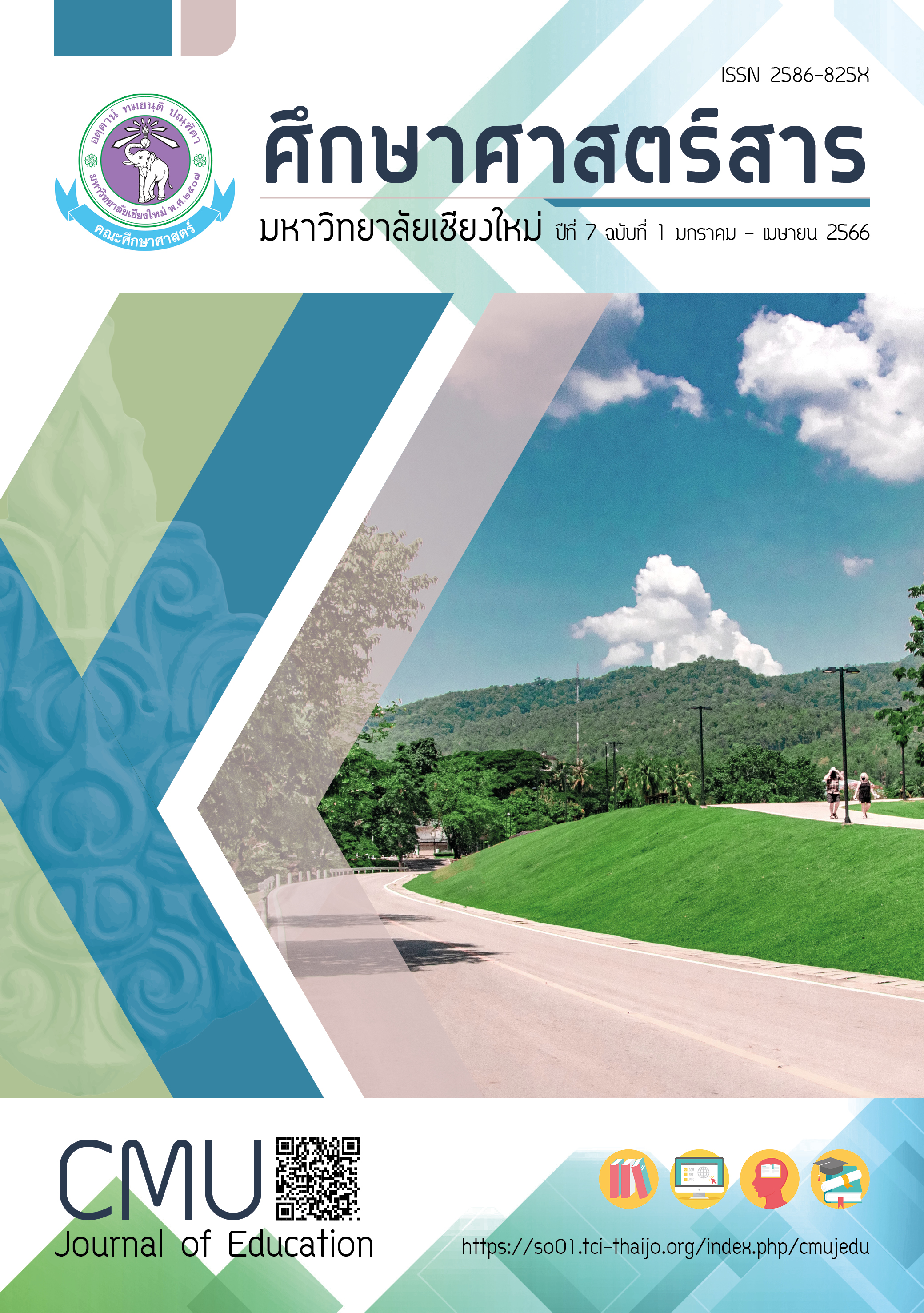มองธรรมชาติวิทยาศาสตร์ในมุมที่ต่างออกไป เพื่อทำความเข้าใจในการสอนฐานสมรรถนะ
Main Article Content
บทคัดย่อ
งานวิจัยที่ผ่านมาได้ชี้ให้เห็นว่า แนวคิดเกี่ยวกับธรรมชาติของวิทยาศาสตร์ ไม่ได้ถูกนำมาใช้เป็นเครื่องมือในการสอนมากเท่าใดนัก โดยส่วนใหญ่พบว่า ครูมักจะสอน "บทเรียนธรรมชาติของวิทยาศาสตร์" ให้กับนักเรียน เพื่อให้นักเรียนเข้าใจแนวคิด ประวัติศาสตร์และปรัชญาของวิทยาศาสตร์เพียงเท่านั้น อาทิ วิทยาศาสตร์มีความคงทนแต่เปลี่ยนแปลงได้ กฎและทฤษฎีมีหน้าที่แตกต่างกัน เป็นต้น ซึ่งยังไม่เพียงพอต่อการพัฒนาสมรรถนะทางวิทยาศาสตร์ เพราะไม่ได้ฝึกฝนกระบวนการสืบเสาะและไม่สามารถตีความข้อมูลหรือให้คำอธิบายต่อปรากฏการณ์ได้ ทั้งนี้จุดสำคัญของการทำความเข้าใจธรรมชาติของวิทยาศาสตร์ คือ การได้มาซึ่งความรู้ทางวิทยาศาสตร์หรือญาณวิทยา บทความวิชาการนี้จึงขอนำเสนอแง่มุมใหม่ของการทำความเข้าใจธรรมชาติวิทยาศาสตร์ที่จะเป็นกุญแจในการออกแบบกิจกรรมการเรียนรู้ในเนื้อหาเฉพาะที่ส่งเสริมสมรรถนะของผู้เรียน โดยจะอธิบายด้วยกรอบแนวคิดของความรู้ในเนื้อหาผนวกวิธีสอน (Pedagogical Content Knowledge: PCK) พร้อมกับวิเคราะห์และยกตัวอย่างกิจกรรมที่ครูวิทยาศาสตร์สามารถนำไปใช้ในห้องเรียนได้
Article Details

อนุญาตภายใต้เงื่อนไข Creative Commons Attribution-NonCommercial-NoDerivatives 4.0 International License.
หากผู้เสนอบทความมีความจำเป็นเร่งด่วนในการตีพิมพ์โปรดส่งลงตีพิมพ์ในวารสารฉบับอื่นแทน โดยกองบรรณาธิการจะไม่รับบทความหากผู้เสนอบทความไม่ปฏิบัติตามเงื่อนไขและขั้นตอนที่กำหนดอย่างเคร่งครัด ข้อมูลของเนื้อหาในบทความถือเป็นลิขสิทธิ์ของ Journal of Inclusive and Innovative Education คณะศึกษาศาสตร์ มหาวิทยาลัยเชียงใหม่
เอกสารอ้างอิง
พงศ์ประพันธ์ พงษ์โสภณ. (2552). สอนวิทยาศาสตร์อย่างที่วิทยาศาสตร์เป็น. วารสารวิทยาศาสตร์, 63(1), 84-89.
วรัญญา จีระวิพูลวรรณ. (2557). การใช้การเรียนรู้แบบสืบเสาะหาความรู้เสริมด้วยวิธีการสอนแบบทำนายสังเกตอธิบายและเปรียบเทียบแบบอุปมาอุปไมยต่อมโนคติเรื่องวงจรไฟฟ้ากระแสตรงของครูวิทยาศาสต์ระดับประถมศึกษา. วารสารหน่วยวิจัยวิทยาศาสตร์ เทคโนโลยี และสิ่งแวดล้อมเพื่อการเรียนรู้, 5(1), 1-10.
สถาบันส่งเสริมการสอนวิทยาศาสตร์และเทคโนโลยี. (2553). ความฉลาดรู้ด้านวิทยาศาสตร์.
เข้าถึงจาก https://pisathailand.ipst.ac.th/about-pisa/scientific-literacy/.
Abd-El-Khalick. (2013). Teaching With and About Nature of Science, and Science Teacher Knowledge Domains. Science & Education, 22(9), 1 – 21.
Abell, S. K. (2008). Twenty Years Later: Does pedagogical content knowledge remain a useful idea?. International Journal of Science Education, 30(10), 105-1416.
Abell, S. K., & Smith, D. C. (1994). What is science?: preservice elementary teachers’ conceptions of the nature of science. International Journal of Science Education, 16(4), 475-487.
American Association for the Advancement of Science. (2009). Project 2061: Science for All Americans (Online). Retrieved from http://www.project2061.org
Gudmundsdottir, S., & Shulman, L. (1987). Pedagogical Content Knowledge in Social Studies. Scandinavian Journal of Educational Research, 31(2), 59-70.
Lederman, N. G., Abd‐El‐Khalick, F., Bell, R. L., & Schwartz, R. S. (2002). Views of nature of science
questionnaire: Toward valid and meaningful assessment of learners' conceptions of nature of
science. Journal of research in science teaching, 39(6), 497-521.
Lederman, N. G., & Laderman, J. S. (2019). Teaching and learning nature of scientific knowledge: Is it Déjà vu all over again? Disciplinary and Interdisciplinary Science Education Research, 1(6), 1-9.
Lederman, N.G. (2006). Syntax Of Nature Of Science Within Inquiry And Science Instruction. In: Flick, L.B.,
Lederman, N.G. (Eds.), Scientific Inquiry and Nature of Science. Science & Technology Education Library (301-317). Dordrecht: Springer.
Lederman, N. G., Abd-El-Khalick, F., Bell, R. L., & Schwartz, R. S. (2002). Views of nature of science
questionnaire: Toward valid and meaningful assessment of learners' conceptions of nature of science. Journal of Research in Science Teaching, 39(6), 497–521.
Lederman, N. G., & Zeidler, D. L. (1987). Science teachers' conceptions of the nature of science: Do they really influence teaching behavior?. Science Teacher Education, 71(5), 721-734.
Magnusson, S., Krajcik, L., & Borko, H. (1999). Nature, sources and development of pedagogical content knowledge. In J. Gess-Newsome & N. G. Lederman (Eds.), Examining pedagogical content knowledge(pp. 95–132). Dordrecht, The Netherlands: Kluwer.
McComas, W.F. (2004). Keys to Teaching the Nature of Science. The Science Teacher, 71, 24-27.
Mccomas, W. F., Clough, M. P., & Nouri, N. (2020). Nature of Science and Classroom Practice: A Review of the Literature with Implications for Effective NOS Instruction. In W. F. Mccomas (Ed.), Nature of Science in Science Instruction: Rationales ans Strategies. Switzerland: Springer.
Nilsson, P., & Loughran, J. (2011). Exploring the Development of Pre-Service Science Elementary Teachers’ Pedagogical Content Knowledge. Journal of Science Teacher, 23(7), 1-23.
OECD. (2013). Education at a Glance 2013: OECD Indicators. France: OECD Publishing.
Park, S., & Oliver, J. S. (2008). Revisiting the Conceptualisation of Pedagogical Content Knowledge (PCK): PCK as a Conceptual Tool to Understand Teachers as Professionals. Research in Science Education, 38, 261-284.
Shulman, L. S. (1986). Those Who Understand: Knowledge Growth in Teaching. Educational Researcher, 15(2), 4-14.


